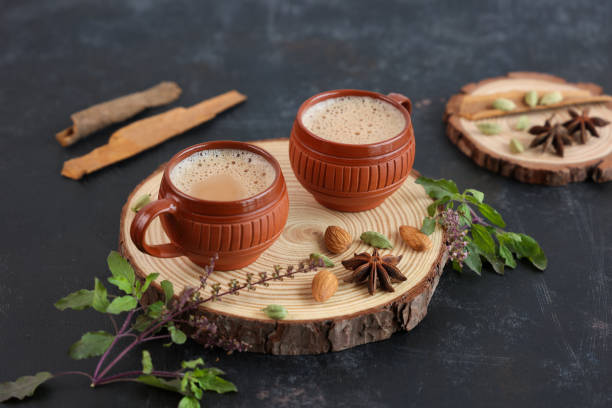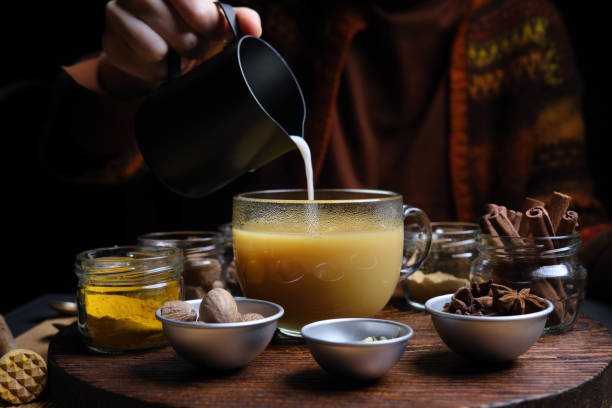When embarking on the quest to discover the perfect blend of warmth, spice, and energy in a cup, chai tea often emerges as a top contender. Renowned for its rich history, aromatic spices, and comforting warmth, this beloved beverage holds a special place in the hearts of tea aficionados around the globe. Yet, amidst its popularity, a common question arises: Does chai tea have caffeine? This inquiry not only reflects a growing consciousness towards dietary caffeine intake but also underscores the quest for a balanced lifestyle where every sip matters.
In this comprehensive exploration, we delve into the heart of chai tea, unraveling its caffeine content and what this means for your daily rituals. Our journey is not just about numbers; it’s a deeper dive into understanding how the caffeine in chai tea interacts with its unique blend of spices, including cardamom, cinnamon, ginger, and cloves, to offer more than just a wake-up call. We establish our expertise on the topic through meticulous research, expert consultations, and a passion for the art of tea, ensuring that every piece of information provided is both accurate and enlightening.
This article promises to illuminate the nuances of chai tea’s caffeine content, offering valuable insights for those looking to balance their caffeine intake without sacrificing the sensory pleasure of their favorite beverage. Whether you’re a devoted chai lover, a health-conscious individual, or simply curious, the revelations herein aim to enrich your understanding and appreciation of chai tea. Prepare to be intrigued as we embark on this flavorful journey, revealing how your beloved cup of chai fits into a lifestyle marked by mindfulness and vitality. Join us as we uncover the caffeine secrets of chai tea, turning every sip into a conscious choice towards wellness and enjoyment.
What Is Chai Tea?

Originating in India, chai tea is a blend of black tea and spices such as cardamom, cinnamon, ginger, cloves, and pepper. The word “chai” actually means tea in Hindi and has been enjoyed for centuries as a traditional beverage. Traditionally, chai-tea is made by brewing the ingredients together with milk and sugar to create a rich and flavorful drink. It is often served in small glasses or cups and is enjoyed throughout the day, especially during social gatherings.
Tracing Chai Tea’s History
To fully appreciate chai, it helps to understand its origins and evolution over the centuries.
The word “chai” itself simply translates to “tea” in Hindi and other Indian languages. “Masala chai” or “masala tea” refers to the unique blend of black tea and aromatic spices added to the brew.
India
The origins of masala chai trace back thousands of years in India. But the signature tea blend we know today emerged more recently, during the colonial era.
In the 1800s, the British East India Company exploited India’s resources and became the largest commercial tea trader in the world. To make their tea more palatable to Indian tastes, they added local spices like cardamom, cinnamon, ginger, and black pepper.
This masala chai was sold from widespread tea stalls and quickly popularized across India as an affordable comfort drink. The addition of milk also helped mellow the bitterness of cheap, strong Assam tea.
Global Spread
As chai gained popularity in India, its cozy allure began spreading worldwide throughout the 1900s.
Chai made its way to Great Britain in the 1950s and America soon after as counterculture youth embraced exotic new flavors. By the 1990s, chai was available in most coffee shops and grocery stores as its popularity boomed.
Today, chai is beloved around the world as a soothing, fragrant beverage. Countless cafes, bakeries, and tea shops proudly serve their own unique chai blends and variations. But the drink’s origins and cultural significance in India remain at its heart.
Understanding Caffeine Levels in Chai Tea
The caffeine in chai tea comes from its base ingredient – black tea. Black tea is made from the leaves of the Camellia sinensis tea plant, which naturally contains caffeine. This makes black tea distinct from herbal teas like chamomile or mint, which are caffeine-free.
So how much caffeine is in a typical cup of chai? Let’s break it down:
- Leaf size and type: The biggest factor is the size and varietal of black tea used. Smaller broken tea leaves allow more caffeine to infuse, while larger whole leaves release less. Assam and other Indian black tea varietals used in chai tend to be slightly higher in caffeine than Chinese blacks.
- Water temperature and steep time: Hotter water and longer steeping extract more caffeine from the leaves. Most chai is prepared with boiling water and allowed to steep for 3-5 minutes. This brings out plenty of flavor and a moderate caffeine level.
- Tea to milk/spice ratio: The more tea used compared to milk and spices, the higher the caffeine content. But traditional masala chai has a strong milk and spice presence which dilutes the caffeine per cup.
Compared to a typical 8 oz cup of brewed black tea with around 40-60mg caffeine, a cup of chai will have 25-35mg on average. So about half the caffeine punch.
Chai Tea – A Milder Caffeine Option than Coffee
Let’s compare chai tea to coffee, which is the quintessential morning caffeine drink for many folks. While coffee dominates as the high-test option, chai offers a more mellow, gentle way to wake up.
An 8 oz cup of regular brewed coffee has around 90-120mg caffeine. Espresso is even higher at around 60-75mg per 1-2 oz shot. So coffee packs 2-4x as much caffeine as a cup of chai, which comes in at 25-35mg per 8oz cup.
For those looking to limit their overall caffeine intake or avoid strong stimulants, chai makes an excellent lower-caffeine alternative. The tea and spice blend provides a soothing warmth and just enough caffeine to take the edge off morning grogginess.
And the range of teas out there gives you even more options to fine-tune your energy boost:
- Herbal teas (caffeine-free): Roobios, chamomile, mint, and other herbals offer comforting flavor without any caffeine.
- White tea (15-20mg): Made from young tea buds and leaves. Delicate flavor with low caffeine.
- Green tea (25-35mg): Unoxidized tea leaves with light-to-moderate caffeine levels.
So if coffee gives you the jitters or interferes with sleep, try subsisting chai tea for an uplifting buzz without the intense crash. The cozy spices like cinnamon, cardamom, and ginger provide plenty of sensory enjoyment even without lots of caffeine.
Beyond Caffeine: Exploring the Potential Benefits of Chai
While the moderate caffeine content is a definite perk, chai tea offers more than just a gentle stimulant effect. The combination of black tea and aromatic spices makes chai a flavorful and potentially healthy beverage.
Antioxidants
Black tea is rich in antioxidant plant compounds like flavonoids and polyphenols. These help neutralize harmful free radicals and may offer benefits like:
- Boosting heart health
- Supporting immune function
- Reducing inflammation
- Protecting cells from damage
Digestion and metabolism
The black tea and spices in chai like cardamom, cinnamon, black pepper, and ginger have long been used in traditional Indian medicine (Ayurveda) to support digestion. Some evidence suggests these spices can:
- Stimulate digestive enzymes
- Relieve bloating and gas
- Settle nausea, motion sickness, and other stomach upsets
This makes a cup of chai the perfect digestive pick-me-up.
Immune boost
Ingredients like ginger, black pepper, fennel, and cloves have natural anti-inflammatory and antimicrobial properties that may give your immune system a healthy boost. What better comfort drink than a homemade cup of masala chai when you’re feeling under the weather?
Stress relief
Warm chai combines the soothing ritual of tea drinking with comforting aromas and a moderately caffeinated pick-me-up. This provides a relaxing lift to combat daily stress and anxiety.
Flavonoid flexibility
Chai spice blends can vary widely. Trying different recipes allows you to take advantage of diverse flavonoids and antioxidants for a range of potential health benefits. Customize your own signature spin.
Enjoying a Cup of Chai Tea

We’ve covered a lot of ground exploring chai tea’s history, ingredients, caffeine content, and potential benefits. To recap the key points:
- Chai tea contains 25-35mg caffeine per 8oz cup, compared to 40-120mg in coffee. So it offers a moderately-caffeinated alternative.
- Black tea provides most of chai’s caffeine, while milk and spices dilute its intensity. Herbal blends are caffeine-free.
- Chai may support heart health, immunity, digestion, and stress relief due to antioxidant and anti-inflammatory compounds.
- Customize your own chai masala blend to create your perfect cup.
With its cozy, comforting aroma and just enough caffeine to take the edge off, chai tea can be easily worked into your daily routine. Try sipping a steaming hot cup first thing in the morning, during an afternoon pick-me-up, or after dinner to aid digestion.
Adjust the ratio of tea leaves, milk, and spices to control caffeine levels and flavor. Brewing chai with care enhances both enjoyment and potential benefits. So pick your favorite mug, put the tea kettle on, and spice up your day with a delicious cup of chai.
